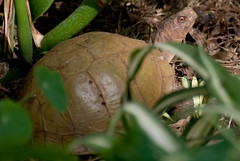That day is upon us when Americans hold an historical observance buy eating themselves into a coma. Yes, tomorrow is Thanksgiving Day. In preparation for the opportunities for overindulgence, tonight I'll be having a nice salad for dinner.
But that's not why I'm here today. Today I wanted to share a Thanksgiving memory with you.
Years ago, around the time of Thanksgiving, we were planning to entertain some German nationals at our home. Rather than have a large, fancy spread one week and a large, homey spread the next (or was it the other way 'round?), we decided to have one large, homey, semi-fancy spread. We had a traditional Thanksgiving feast for the Germans.
Originally, I had planned on roasting a small (~8 pound) turkey, so I upgraded to a larger (~14 pound) turkey, baked two pies (instead of one), and added a couple of side dishes. (Turkey, sausage & wild rice dressing, gravy, cranberry sauce, dinner rolls, tossed salad, baked potatoes, candied yams, peas, corn, I think I made green bean casserole, apple pie, pumpkin pie, and I don't remember what else, but I'm sure there was more.)
When our visitors arrived, their eyes got really big. After much chattering amongst themselves (most of which I understood, but wasn't ready to interrupt), they turned to us and their representative told us that the other three were convinced that the bird in question was a goose. The rep had tried to explain that it was a turkey, but they weren't buying it.
I turned to the rest and explained, "Nein, das is nicht eine Gans. Es it ein Truthan." (No, that's not a goose. It's a turkey.) Since I was using the right words, they were starting to lean toward believing it, but it took a little more time to explain that Americans (mostly) don't hunt wild turkeys like they do in Germany. We have bred turkeys to be HUGE.
Then they turned their attention to all the other food. They were astounded. We started trying to explain Thanksgiving to them. They mostly understood English (if you spoke slowly using simple language and sentence structure), but when they heard something that didn't fit into their reality, they would turn to the rep to ask for a translation. Then there would be disagreement, the rep must also have misunderstood. Eventually, when needed, I would reiterate in german. Eventually, they would acquiesce, but it didn't mean they "got it." It meant they heard and understood the words.
Then I started pulling more prepared dishes from the fridge and from the ovens. More confusion. We explained: "Man isst, bis man Schmerz hat." (You eat till you are in pain.)
Well, we had a lovely dinner. Lots of chit-chat. Bouncing back and forth between English and German. Eating till we had pain. We all were greatly entertained when we offered tea to our guests. One of the offerings was a tea I had bought in Nevada City: Whale Tea* ("*contains no whale"). Americans have problems with German humor and, apparently, it cuts both ways. (Yes, they tried the Walfisch Tee and enjoyed it.)
After dinner we repaired to the living room (well, I was mostly clearing the table and tidying the kitchen) where we entertained our guests with an episode of Monty Python's Flying Circus. It happened to be an episode with a long sketch with Germans mocking the French. And sheep. Our guests had variously loosened their belts, completely unfastened their belts, and unfastened the top button of their pants. They were definitely making themselves at home and it was great!
Then I appeared to ask whether they each wanted pumpkin pie, apple pie, or both. Ice cream, whipped cream, or both. I have to say, they were definitely rolling with the whole thing by then. (Did I mention they had undone their pants?) They went with both and both. :-)
I'm sure those four went back home with enough stories to tell to last for years.
Fire and Chaparral - Some Questions
7 years ago











Great story. Love the whale tea. Think I'll go have some tea right now, cold enough.
ReplyDelete